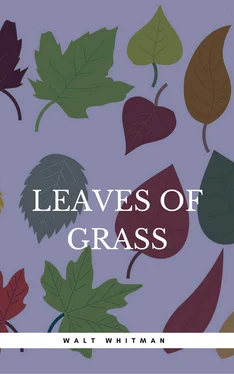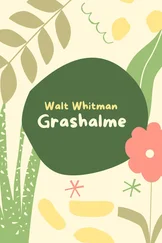Walt Whitman - Leaves of Grass
Здесь есть возможность читать онлайн «Walt Whitman - Leaves of Grass» — ознакомительный отрывок электронной книги совершенно бесплатно, а после прочтения отрывка купить полную версию. В некоторых случаях можно слушать аудио, скачать через торрент в формате fb2 и присутствует краткое содержание. ISBN: , Жанр: Языкознание, Критика, на английском языке. Описание произведения, (предисловие) а так же отзывы посетителей доступны на портале библиотеки ЛибКат.
- Название:Leaves of Grass
- Автор:
- Жанр:
- Год:неизвестен
- ISBN:9782377930524
- Рейтинг книги:4 / 5. Голосов: 1
-
Избранное:Добавить в избранное
- Отзывы:
-
Ваша оценка:
- 80
- 1
- 2
- 3
- 4
- 5
Leaves of Grass: краткое содержание, описание и аннотация
Предлагаем к чтению аннотацию, описание, краткое содержание или предисловие (зависит от того, что написал сам автор книги «Leaves of Grass»). Если вы не нашли необходимую информацию о книге — напишите в комментариях, мы постараемся отыскать её.
Leaves of Grass — читать онлайн ознакомительный отрывок
Ниже представлен текст книги, разбитый по страницам. Система сохранения места последней прочитанной страницы, позволяет с удобством читать онлайн бесплатно книгу «Leaves of Grass», без необходимости каждый раз заново искать на чём Вы остановились. Поставьте закладку, и сможете в любой момент перейти на страницу, на которой закончили чтение.
Интервал:
Закладка:
Of course, we shall have a national character, an identity. As it ought to be, and as soon as it ought to be, it will be. That, with much else, takes care of itself, is a result, and the cause of greater results. With Ohio, Illinois, Missouri, Oregon—with the states around the Mexican sea—with cheerfully welcomed immigrants from Europe, Asia, Africa—with Connecticut, Vermont, New Hampshire, Rhode Island—with all varied interests, facts, beliefs, parties, genesis—there is being fused a determined character, fit for the broadest use for the freewomen and freemen of The States, accomplished and to be accomplished, without any exception whatever—each indeed free, each idiomatic, as becomes live states and men, but each adhering to one enclosing general form of politics, manners, talk, personal style, as the plenteous varieties of the race adhere to one physical form. Such character is the brain and spine to all, including literature, including poems. Such character, strong, limber, just, open-mouthed, American-blooded, full of pride, full of ease, of passionate friendliness, is to stand compact upon that vast basis of the supremacy of Individuality—that new moral American continent without which, I see, the physical continent remained incomplete, may-be a carcass, a bloat—that newer America, answering face to face with The States, with ever-satisfying and ever-unsurveyable seas and shores.
Those shores you found. I say you have led The States there—have led Me there. I say that none has ever done, or ever can do, a greater deed for The States, than your deed. Others may line out the lines, build cities, work mines, break up farms; it is yours to have been the original true Captain who put to sea, intuitive, positive, rendering the first report, to be told less by any report, and more by the mariners of a thousand bays, in each tack of their arriving and departing, many years after you.
Receive, dear Master, these statements and assurances through me, for all the young men, and for an earnest that we know none before you, but the best following you; and that we demand to take your name into our keeping, and that we understand what you have indicated, and find the same indicated in ourselves, and that we will stick to it and enlarge upon it through These States.
Walt Whitman.Opinions. 1855-6
1856
From the London Weekly Dispatch. (London, England.)
LEAVES OF GRASS. By Walt Whitman. Horsell, Oxford Street.
We have before us one of the most extraordinary specimens of Yankee intelligence and American eccentricity in authorship, it is possible to conceive. It is of a genus so peculiar as to embarrass us, and has an air at once so novel, so audacious, and so strange as to verge upon absurdity, and yet it would be an injustice to pronounce it so, as the work is saved from this extreme by a certain mastery over diction not very easy of definition. What Emerson has pronounced to be good must not be lightly treated, and before we pronounce upon the merits of this performance it is but right to examine them. We have, then, a series of pithy prose sentences strung together—forming twelve grand divisions in all, but which, having a rude rhymical cadence about them, admit of the designation poetical being applied. They are destitute of rhyme, measure of feet, and the like, every condition under which poetry is generally understood to exist being absent; but in their strength of expression, their fervor, hearty wholesomeness, their originality, mannerism, and freshness, one finds in them a singular harmony and flow, as if by reading, they gradually formed themselves into melody, and adopted characteristics peculiar and appropriate to themselves alone. If, however, some sentences be fine, there are others altogether laughable; nevertheless, in the bare strength, the unhesitating frankness of a man who “believes in the flesh and the appetites,” and who dares to call simplest things by their plainest names, conveying also a large sense of the beautiful, and with an emphasis which gives a clearer conception of what manly modesty really is than any thing we have, in all conventional forms of word, deed, or act so far known of, that we rid ourselves, little by little, of the strangeness with which we greet this bluff new-comer, and, beginning to understand him better, appreciate him in proportion as he becomes more known. He will soon make his way into the confidence of his readers, and his poems in time will become a pregnant text-book, out of which quotation as sterling as the minted gold will be taken and applied to every form and phase of the “inner” or the “outer” life; and we express our pleasure in making the acquaintance of Walt Whitman, hoping to know more of him in time to come.
From the Brooklyn Daily Times
LEAVES OF GRASS. A volume of Poems, just published.
To give judgment on real poems, one needs an account of the poet himself. Very devilish to some, and very divine to some, will appear the poet of these new poems, the “ Leaves of Grass ;” an attempt, as they are, of a naive, masculine, affectionate, contemplative, sensual, imperious person, to cast into literature not only his own grit and arrogance, but his own flesh and form, undraped, regardless of models, regardless of modesty or law, and ignorant or silently scornful, as at first appears, of all except his own presence and experience, and all outside the fiercely loved land of his birth, and the birth of his parents and their parents for several generations before him. Politeness this man has none, and regulation he has none. A rude child of the people!—No imitation—No foreigner—but a growth and idiom of America. No discontented—a careless slouch, enjoying to-day. No dilletant democrat—a man who is art-and-part with the commonalty, and with immediate life—loves the streets—loves the docks—loves the free rasping talk of men—likes to be called by his given name, and nobody at all need Mr him—can laugh with laughers—likes the cheap ways of laborers—is not prejudiced one mite against the Irish—talks readily with them—talks readily with niggers—does not make a stand on being a gentleman, nor on learning or manners—eats cheap fare, likes the strong-flavored coffee of the coffee-stands in the market, at sunrise—likes a supper of oysters fresh from the oyster-smack—likes to make one at the crowded table among sailors and workpeople—would leave a select soiree of elegant people any time to go with tumultuous men, roughs, receive their caresses and welcome, listen to their noise, oaths, smut, fluency, laughter, repartee—and can preserve his presence perfectly among these, and the like of these. The effects he produces in his poems are no effects of artists or the arts, but effects of the original eye or arm, or the actual atmosphere or tree or bird. You may feel the unconscious teaching of a fine brute, but will never feel the teaching of a fine writer or speaker.
Other poets celebrate great events, personages, romances, wars, loves, passions, the victories and power of their country, or some real or imagined incident—and polish their work, and come to conclusions, and satisfy the reader. This poet celebrates himself; and that is the way he celebrates all. He comes to no conclusions, and does not satisfy the reader. He certainly leaves him what the serpent left the woman and the man, the taste of the Paradisaic tree of the knowledge of good and evil, never to be erased again.
What good is it to argue about egotism? There can be no two thoughts on Walt Whitman’s egotism. That is avowedly what he steps out of the crowd and turns and faces them for. Mark, critics! Otherwise is not used for you the key that leads to the use of the other keys to this well-enveloped man. His whole work, his life, manners, friendships, writings, all have among their leading purposes an evident purpose to stamp a new type of character, namely his own, and indelibly fix it and publish it, not for a model but an illustration, for the present and future of American letters and American young men, for the south the same as the north, and for the Pacific and Mississippi country, and Wisconsin and Texas and Kansas and Canada and Havana and Nicaragua, just as much as New York and Boston. Whatever is needed toward this achievement he puts his hand to, and lets imputations take their time to die.
Читать дальшеИнтервал:
Закладка:
Похожие книги на «Leaves of Grass»
Представляем Вашему вниманию похожие книги на «Leaves of Grass» списком для выбора. Мы отобрали схожую по названию и смыслу литературу в надежде предоставить читателям больше вариантов отыскать новые, интересные, ещё непрочитанные произведения.
Обсуждение, отзывы о книге «Leaves of Grass» и просто собственные мнения читателей. Оставьте ваши комментарии, напишите, что Вы думаете о произведении, его смысле или главных героях. Укажите что конкретно понравилось, а что нет, и почему Вы так считаете.












